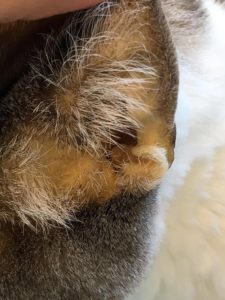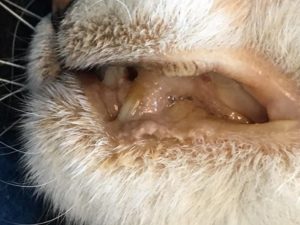Jaundice, also known as icterus, is a condition characterized by yellowing of the skin. It occurs in both cats and dogs and can indicate a number of serious underlying health issues.
Causes of Jaundice
The characteristic yellow pigmentation associated with jaundice is caused by a buildup of bilirubin in the blood and tissues. This substance is produced by the breakdown of red blood cells in the body. Certain conditions can cause an increased rate of red blood cell breakdown, leading to the accumulation of bilirubin in tissues. These include liver disease, autoimmune diseases, infection, drug toxicity, and bile duct obstruction.
Symptoms of Jaundice
Please visit your veterinarian immediately if you notice any of the following symptoms of jaundice so your pet can be correctly diagnosed and treated.
- Yellow discoloration of the skin, eyes, ears, or gums
- Polydipsia (increased thirst)
- Polyuria (increased urination)
- Discolored urine
- Diarrhea
- Vomiting
- Lethargy
- Weakness
- Loss of appetite
- Dehydration
Diagnosis of Jaundice
Your veterinarian will evaluate your pet’s medical history and ask you a series of questions about the onset and severity of their symptoms. They will then perform a thorough physical examination to check for clinical signs of jaundice such as yellowing of the skin.
Diagnostic tests may include a complete blood count, biochemistry profile, and urinalysis. These tests will help your veterinarian identify abnormalities in the blood, assess liver function, and check levels of bilirubin in your pet’s urine. In addition, specialized tests such as X-rays, ultrasounds, or a liver biopsy may be recommended to rule out issues such as tumors or obstructions.
Treatment of Jaundice
Treatment of jaundice will depend on the underlying cause of the condition. In some cases, hospitalization will be necessary to stabilize your pet and monitor their health. Pets with serious underlying illnesses will also require specialized treatment.
Potential treatments for jaundice include antibiotics to address infections, surgery to correct bile duct obstruction, and drug therapy to treat autoimmune diseases. Please speak to your veterinarian about appropriate treatment options for your pet.
Prevention of Jaundice
Since there are so many potential underlying causes of jaundice in pets, the condition can be difficult to prevent. We recommend feeding a complete and balanced diet to support your pet’s overall health and wellbeing. It’s also important to schedule regular veterinary appointments so your pet’s health can be monitored throughout their lifetime.



